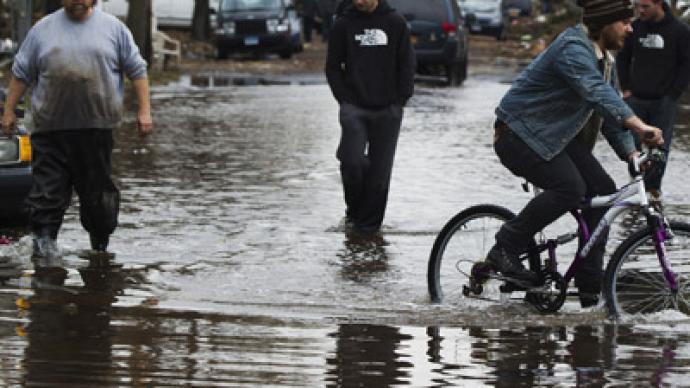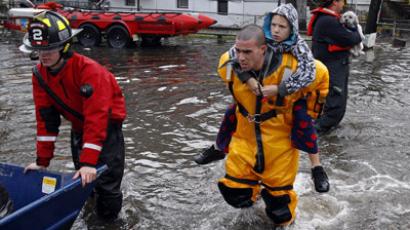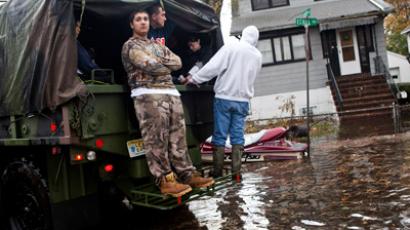New York City cancels annual marathon in the wake of Sandy

Less than 48 hours before the New York City Marathon was scheduled to begin, officials have decided to cancel the annual race as the Big Apple continues to pick up the pieces after Superstorm Sandy.
From Staten Island to South Manhattan, the City that Never Sleeps has been transformed to the City That Always Swims ever since Superstorm Sandy ravaged the East Coast earlier this week, flooding streets and downing power lines in some of the biggest metropolitan regions in the country. Sandy has so far taken nearly 100 lives and is being blamed for perhaps $50 billion in damages according to some early estimates, but even if New York has been turned into a disaster site by Mother Nature, Mayor Michael Bloomberg intended on making sure the city still hosts its annual 26.2 mile race this weekend, come hell or high water.“This city is a city where we have to go on,” Mr. Bloomberg told reporters this week, insisting that the world-renowned race will be crucial for New York’s economy, especially the small businesses and hotels that are expected to make bank from out-of-state and international athletes already en route to the contest. On Friday afternoon, NBC News confirmed that the marathon has been put on hold. The office of Mayor Bloomberg confirmed the report over Twitter moments later.On Thursday, Bloomberg defended his decision to not cancel the marathon and vowed that all of Manhattan will have their electricity up and running by Sunday. For many New Yorkers who have been kicked from their homes and left relying on government assistance and the kindness of others to fend through one of the worst storms to hit the city in recent memory, though, they think the mayor’s efforts could be better utilized by aiding and protecting his own people — not ensuring that a lengthy footrace goes on as planned, requiring hundreds of emergency workers to walk away from storm-wrecked neighborhoods where the city’s actual residents are in dire straits. In his remarks, Mayor Bloomberg also said the dozens of people who have perished because of the storm — including at least one off-duty NYPD officer — would want the race to go on.“It’s a great event for New York, and I think for those who were lost, you’ve got to believe they would want us to have an economy and have a city go on for those that they left behind,” he said Wednesday.Alfred P Doblin, an editorial columnist for the North Jersey Record and a former contestant in the marathon, doesn’t think that was a statement worth releasing. In fact, he calls the mayor’s remark “somewhere between insensitive and idiotic.”“To suggest that anyone who died as a result of Hurricane Sandy would give a hoot about the New York City Marathon shows how out of touch Michael Bloomberg is with real people, despite moments of brilliant leadership this week,” Doblin writes. In Staten Island where the race is expected to begin, for example, he acknowledges that 19 people have so far been killed because of Sandy. “Its residents are in need of many things; more than 40,000 runners, plus support personnel, are not on the list.”Mayor Bloomberg has a list of his own, however, and the New York Post reports that so far the city has used its resources on securing three diesel-powered generators to bring power to the city. Not for the suffering, though — no, no, no. Those 800 kilowatt-cranking machines have been stationed in Central Park and are reportedly on 24-hours a day so that the media tent near the marathon’s finish line can provide juice to the laptops and cameras of reporters. Those same generators, if used otherwise, could power around 400 homes, the paper notes.“They should bring all of these generators to buildings where old people live and give them power,” Yelena Gomelsky, 65, tells the Post. In her neighborhood of Coney Island, she says everything is flooded and underwater. She is far from being the only one, as well, and now city officials — albeit ones without the same clout Mayor Bloomberg brings to the table — are calling out his decision to keep the race going as planned."New Yorkers in Staten Island, the Rockaways, Coney Island and Lower Manhattan are struggling to keep body and soul together, deprived of basic essentials as temperatures drop," Manhattan Borough President Scott Stringer said Friday. "For this reason, and after significant deliberation, I believe we should postpone and re-schedule the New York City Marathon in order to focus all of the City's resources on the crucial task of helping our neighbors recover from this disaster. New Yorkers deserve nothing less than to know that the entire government is focused solely on returning the City and their region back to normalcy."Staten Island Borough President Jim Molinaro adds that Bloomberg’s decision to keep the race going is “crazy” and “asinine,” especially given the damage his borough has experienced. “My God. What we have here is terrible, a disaster,” Molinaro said Wednesday. “If they want to race, let them race with themselves. This is no time for a parade. A marathon is a parade. Now is the time to put your shoulder to the wheel. If they want to prepare for something, let them prepare for the election, not a marathon.”“Do you realize how many police officers you need for a marathon?” he asked. “There are people looting stores on Midland Avenue. There is looting taking place in the homes on the South Shore that were destroyed. That is where we need the police.”Mayor Bloomberg said that the police officers required to work the marathon will be largely back to their regular shifts by Sunday’s race because restored power won’t put cops on patrol in the neighborhoods they’ve seen been dispatched to in order to aid emergency efforts. If police presence at the marathon is on par with statistics from previous years, the city can expect 1,000 full-time police officers and 500 auxiliary cops on the scene, the New York Times reports. The paper notes, however, that “some officers themselves may be without power at home,” but Bloomberg is adamant about refocusing law enforcement on the race, not the ravaged city he is tasked with running.“I’ve written two e-mails to the Road Runners saying, ‘Just postpone it.’ That way, you’ll still get the money, you’ll still have a high-profile event, but it would show that you’re being sensitive,” New York Fire Department Lieutenant Simon Ressner tells the Times. “But now, we’re not going to show the world we’re resilient, we’re going to show them we’re selfish.”Mary Wittenberg, the president of the Road Runners Club that is hosting the marathon, tells the Los Angeles Times that around one-sixth of the entrants expected to participate in the race are likely to cancel. She adds, however, that the New York Road Runners plan to donate $1 million to recovery efforts using funding brought in by the race.“New Jerseyans and New Yorkers are in their own marathon – a long, hard road of pain and push is still ahead. We don’t need 40,000-plus amateurs. We are in the real thing,” Doblin writes for the Reporter. “Cancel the race.”By Friday, a petition asked for the nixing of the event has garnered over 5,000 signatures. Scott M. Stringer, the Manhattan borough president, has also called for the cancelation, noting that residents across New York “are struggling to keep body and soul together, deprived of basic essentials as temperatures drop.”Stringer added in a statement on Friday that he thinks the race should be postponed “to focus all of the city’s resources on the crucial task of helping our neighbors recover from this disaster.” The 2001 marathon was held seven weeks after the terrorist attacks on September 11 that left nearly 3,000 people dead.














